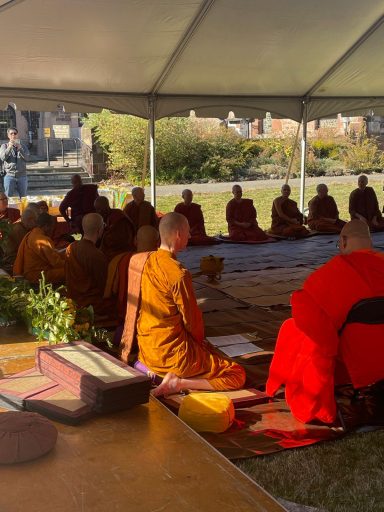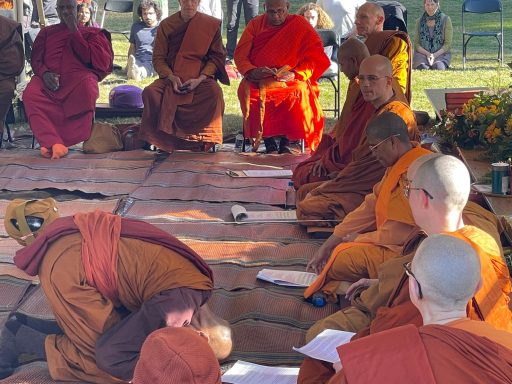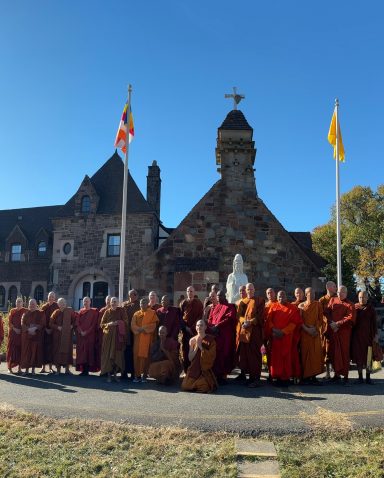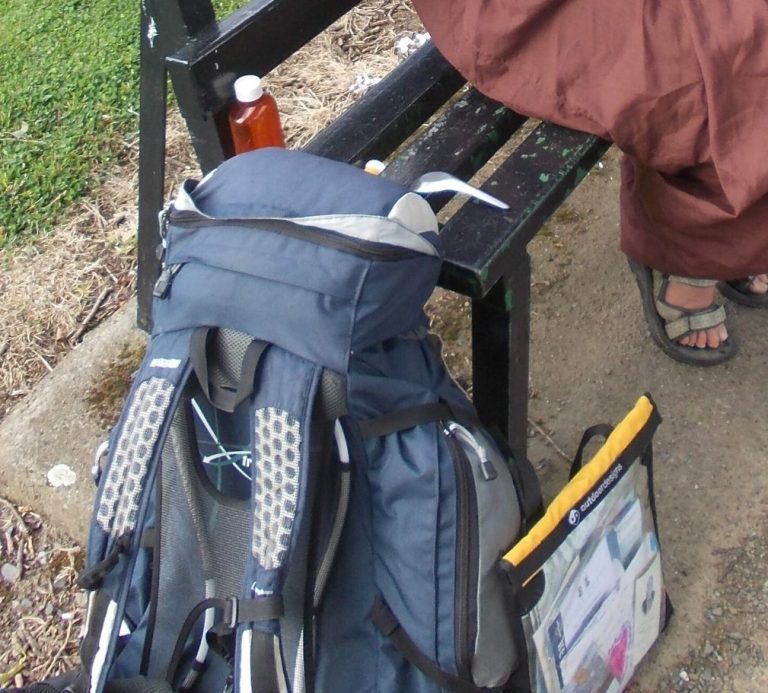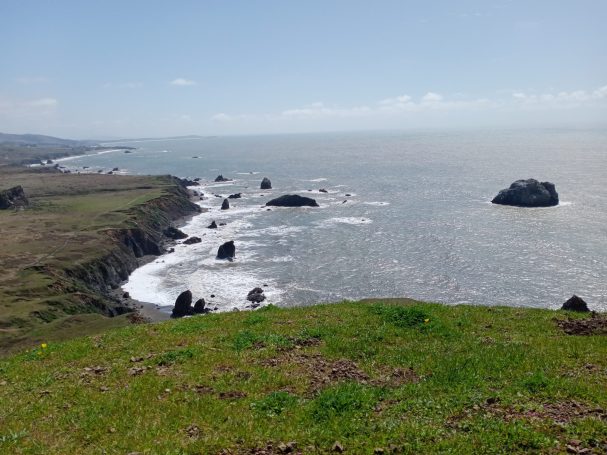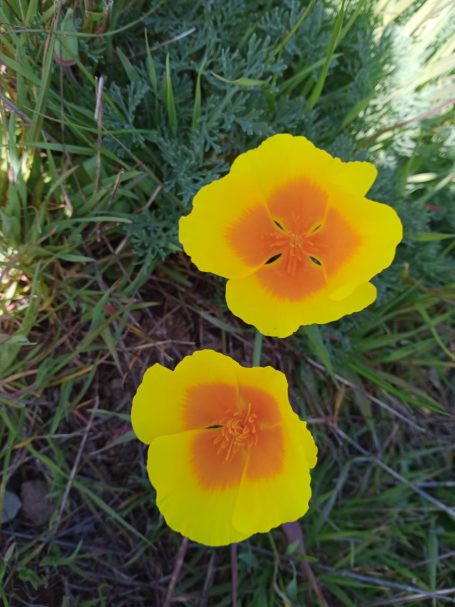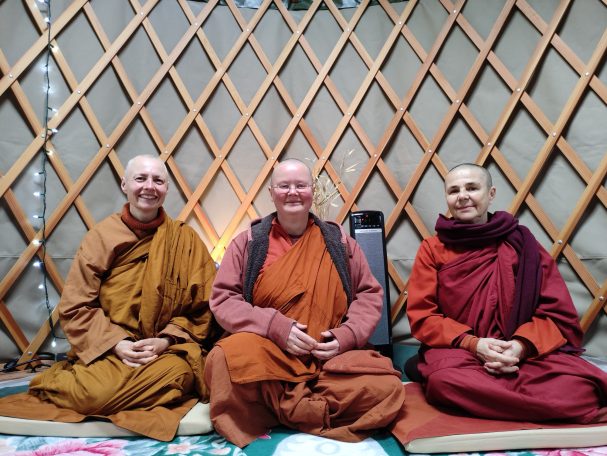Guided Meditation
on Body Awareness, Impermanence and Not-Self
Grief, Letting Go
& the Truth
of Impermanence
A Buddhist Reflection
on Death, Dāna and Dhamma
Guided Meditation
for Relaxation
and
Mindful Awareness
A 30 minute Body-Based Practice
Guided Meditation
on Ageing, Impermanence and Death
Maranasati & Anicca Practice
Resting in Stillness
- A Guided Meditation
Present Moment Awareness
Guided Meditation on the Four Elements
Cultivating Mindfulness of the Body
How Awareness of Change
Leads to Stream Entry
The Buddha's Radical Teaching
on Impermanence
Guided Meditation
on Impermanence
Cultivating Insight into the
Changing Nature of all Experience
Gently, Kindly - A Guided Meditation
Inviting Awareness, Kindness and Embodiment
Leading Inwards
- A Guided Meditation
Exploring the Transformative
Power of Mindfulness
Guided Body Parts Meditation
A 40 minute Journey through the body as taught by the Buddha
Observing Impermanence in Meditation
30 min guided meditation
opening to the changing nature of reality
The Arising
and Cessation
of Dukkha
"Contemplating Pairs”
Dvayatānupassanā Sutta
Sutta Nipāta 3.12.

Investigating Desire
Anupādāparinibbānatthaṃ
Bhagavati brahmacariyaṃ vussati'ti
This short verse above is from Majjhima 43, the Relay Chariot Sutta. Sāriputta is speaking to another monk called Puṇṇa, who is honoured and renowned amongst the Sangha for being a truly excellent monk. Sāriputta, in the course of this conversation, is explaining to Puṇṇa what is the crux, what is the actuality, what is the essence of the Holy Life. What are we practising for?
And Sāriputta says this, "Anupādāparinibbānatthaṃ Bhagavati brahmacariyaṃ vussati."
What he is saying is that the Holy Life is lived for just this - for the sake of letting go of upādāna, of clinging. This is the purpose of the Holy Life. Nibbāna is that which is without grasping, without clinging.
I would like to explore a little bit this topic of clinging or grasping, upādāna. Upādāna is the aspect of our predicament, where the mind inclines towards reaching out, leaning towards, wanting, desiring.
In the Buddha's teaching on 12 steps of dependent origination we can learn that the cause of all things is ignorance. As a result of ignorance we come into being, we have these bodies and minds. We have these six senses that are constantly receiving through hearing, seeing, smelling, tasting, touching and thinking. What is happening when there is such contact is that we feel, and through feeling we incline towards or away from our experience. Thus craving arises, tanha. When craving is unchecked, when it is not seen for the source of suffering that it is, then the mind will incline toward growing that craving. And when we grow craving we experience grasping, upādāna. And the result of grasping is more becoming, more birth, more death, more suffering, more samsāra.
And so clinging, this quality of craving or grasping, is something we need to investigate deeply. The Buddha gave us many teachings to help us in this endeavour.
The Buddha said that there are four kinds of clinging or grasping that we will experience. He gave most importance to the first of these, which is kāmupādāna, craving for sense pleasures. This is really the root of all clinging and it is the last aspect of grasping to disappear, to be overcome, to be seen through before it is possible to become fully liberated from suffering. This aspect of our predicament was well known, and still is well known to many spiritual practitioners in all different traditions. Christians know this well, Muslims know this well . . . at the time of the Buddha there were many spiritual teachers who knew this and were teaching their disciples, "You must aim, you must try, you must work and train towards letting go of sense desire." So this is something that is widely understood and we can appreciate this when we investigate religious traditions.
What is it about sense desire, the sense realm, the delights and pleasures of the sense realm, the comforts and treats of the sense realm - what is it about all of this which is so dangerous for us? What is so harmful?
We need to really investigate this for ourselves to find out - what is the danger, what is the problem with enjoying life, enjoying these bodies, enjoying good food, enjoying sexual activity, enjoying all the movements of the heart - desiring, lusting after, delighting in the world?
As students of the Buddha we know that none of these delights last. We cannot hold on to pleasure. The other side of pleasure, the loss of pleasure, the end of pleasure is painful. And so when we incline towards sense delights we put ourselves on the roller coaster of pleasure and pain. Every up has a down. With every delight, every enjoyable experience there is the seed of suffering, which is its demise, that it changes, that it cannot last.
There are other dangers to consider. It is not easy for us to let go of the inclination to enjoy sense pleasures. So let's also remember how the Buddha said that it is through desire for sense pleasure that all the strife and turmoil in the world comes to be. Why are people fighting? Why are people bombing each other? Why are people committing genocide? - In order to get something. To get their land, to get their wealth, to feel safe. To get, take, steal from others, obliterate others so that we can have more pleasures and feel more comfortable ourselves. It is as stark and as brutal as that.
Many stories can come about to excuse and explain, to cover over or to find reasons for destruction and killing and war and genocide to be OK. All of these excuses and reasons fall into the next category, the clinging to views.
And so let's be very cautious, very wary of this natural experience of enjoyment of sense pleasures that we have. Let's remember how dangerous it can be to become acquainted, conditioned around, used to degrees of comfort and well being. Because when these things are taken away from us we can become very hostile, aggressive, disturbed. It can be difficult for us to maintain our virtue .
So therefore we can remember the Buddha's many teachings on renunciation.and recognise that to let go of pleasure, to step back from indulgence in sense pleasures is to really strengthen ourselves. It is to give ourselves a great gift. The gift of freedom from the dependence upon any particular conditions.
This is where monastic life is extremely helpful because we've let go of choosing what we eat or where we go. We don't have money to spend. We don't have possessions, apart from the most basic requirements of clothing, a meal a day, medicines when sick and some kind of shelter for the night. This is enormously helpful. We can all consider how to simplify our lives so that we have this opportunity to strengthen ourselves, to be free from the fear of losing the comforts that we have become used to.
So sense desire in every tradition is considered a problem. The understanding is that the things of this world are here to ensnare us, to tempt us, to lead us astray. This is not to become sour and negative about the world, the beauty and incredible diversity of this world. It's just to recognise that this is not the way to happiness. To make this our refuge, to incline towards this world, with all its pleasures and pains, is not going to liberate us from suffering.
The second of the four types of clinging that the Buddha described is diṭṭhupādāna, the clinging to views. To thoughts, basically. To our views and opinions, our understanding of the way things are. This is not to be clung to.
It's not to give up on all views and refuse to have a view about anything at all. That would be foolish. Actually one of the Eightfold Noble Path factors is Right View. So there is the view that is right, that we want to cultivate.
And what is that Right View that we want to cultivate? The only view worth having, cultivating or investigating is the Right View which is understanding the Four Noble Truths. To understand suffering, the cause of suffering - desire, clinging, grasping, craving - the end of suffering, letting go of all that. And the Eightfold Path which is the way that leads us to the end of suffering. This is Right View, truly the only view that we want to give energy to.
All other views, opinions and ideas about things are to be questioned. To be held lightly, to be let go of.
We have the very natural inclination to want to understand the world around us. We want to make sense of it. We are going to be formulating views all the time at this level of making sense of the world. We can get into more proliferation around this when we look at things like politics, ideas about how to organise ourselves in community, ideas about more subtle and refined aspects of right and wrong, good and bad, philosophy . . .There's so much higher thinking that happens in our human realm, so many different ways in which we can divide and dissect reality to try and formulate an understanding of it. And this endeavour can be respected and appreciated. But in the end, let's remember that holding to any kind of view about anything whatsoever is a source of suffering for us.
Most particularly if that view is challenged!
We can see how it is, how when we have a view of any kind - if it's challenged, how does that feel? I've had experiences in groups, meetings where I will express some sort of opinion and its not even particularly strongly held and yet . . . something happens when our views are challenged. Even if they are lightly held, when they are challenged they can actually start to firm up and we find ourselves arguing about some view that we didn't even care much about until it was questioned by others.
How easily we can start to rigidify and clash and argue and dispute around views and opinions! This is also a source of great danger for us. Even to the extent that we can fight, we can clash with others through holding to views. So diṭṭhupādāna, this attachment to views is something to investigate. And let's remember, whatever we think about anything is never quite going to meet reality. Because the mind cannot, its too limited, to grasp the bigger picture.
So can we question our understanding? Can we bring in an element of doubt, of scepticism? Around our thoughts, our cherished beliefs, our views? Can we open to the possibility that they may not be the whole picture?
Of course they feel right. Of course they feel like they are the correct way of seeing things, because otherwise we would choose to see things in a different way. But can we hold that lightly? Can we abstain from, refrain from arguing with others who have a different way of seeing things? Can we avoid making others wrong? Bad? Stupid? Immoral? Just because they don't have the same views that we have. Can we have a softness around our views? That gives us then the ability to listen to others, to take in their views and really consider them. And give respect to the possibility that they may even be right.
Who knows?
There's a famous story of Ajahn Chah, when he was the Abbot of Wat Nong Pah Pong. A Christian woman used to come and visit quite often. She wanted to convert the monks to Christianity. Because they needed to know that Jesus Christ was their saviour. Without believing in Him, or in that idea, they would surely go to hell. And so she had this sense of mission and she used to visit the monastery a lot to help the poor, deluded monks there. The monks complained to Ajahn Chah, "This woman keeps coming along, hassling us. She isn't at all interested in the Buddha Dhamma. She just wants to speak about her own views and opinions and wants us to believe the same way she does."
And Ajahn Chah said to them, "Well, she's welcome, and after all, she might be right."
There are two more kinds of upādāna, of grasping. The third kind of grasping is the grasping of rites and rituals - sīlabbattupādāna. Sīlabbata, sīla is virtue or Precepts and bata is the means, how to enact.
Every spiritual tradition makes use of rituals. We do in Buddhism of course. We all chant, we all recite reflections at the Mealtime, we all have the beautiful ritual of bowing to the Buddharūpa when we enter a room, particularly a shrine room, sālā, we offer flowers and incense to a Buddha image, to the shrine, to the altar, prostrate, pay homage to the Buddha by bowing and so forth. In all traditions there are these kinds of rituals. It's so beautiful to watch in Islam, when they all come together five times a day to worship, how full body prostrations are practised. And in the Tibetan tradition too, these full body prostrations.
I remember going around Mount Kailash in Tibet, as a pilgrim, and how very moving it was to see Tibetan lay people and monastics making pilgrimage around this huge mountain, three or four days walk, at very high altitude so you can't breath very easily. A difficult pilgrimage to make on foot. But the Tibetan practitioners would prostrate every few steps - three steps forward and a full body prostration. And then get up, dust themselves down, take three steps forward and another full body prostration. And so every inch of the way, prostrating the whole body. It takes days of course to do the pilgrimage in this way. Impressive and amazing.
Now to say that rites and rituals are meaningless, deluded, insignificant - would be to miss the point. These rites and rituals have a place. They can be skillful means for us. But the balance is not to hold to them, not to grasp them in a way of magical thinking, where we fall into the kind of misunderstanding, where we think that the performing of these kind of rituals is actually going to liberate the heart from suffering.
And yet we can make use of rites and rituals, using them lightly, knowing that they are just that. They are not going to do the work for us but they can be a way in which we can open our hearts to the practice. For example, we can come together in a group and all bow to the Buddha as an act of mutual devotion, to uplift us.
So we may have these ways of practising bringing in ritual, bringing in rites, using them perhaps on a daily basis. And we see this also in so many spiritual traditions. We can appreciate the benefit of such practises without grasping at them and making them more than they are. The Buddha was pointing to the fact that people can get into rites and rituals to the extent that they can take over and all the wisdom aspects of Path, all the insightfulness can be left behind. We can find ourselves just doing the same old rituals out of habit, having lost the sense of profound meaning, lost the sense of the meaning or significance of bathing in the Ganges river three times a day, the significance of chanting. We can be chanting without paying any attention to the meaning. And to do this is to fall into sīlabbattupādāna.
Yes, we are creatures of habit aren't we? We will tend to repeat the same old things day after day. This is how we are programmed. We find great comfort in following habits and patterns and routines. Look at children. Look at older people. How much they relax into routines, because you know what you are going to be doing next, A follows B follows C, or the other way around. And its the same in monasteries. We have routines through the day, through the week. Let's not allow ourselves, just because we come to the monastery every weekend, and do this and then that and then this . . . Let's not ease into some sort of sleepy, mindless enjoyment of ritual. Let's remember the purpose behind what are doing. Why we are doing it.
And the fourth is attavādupādāna. Attavāda is the view, the idea of self. This aspect has its coarser and its more refined aspects. the coarse aspect of self view is something that we can see through without too much difficulty. A stream enterer has let go of this fetter of self view. A stream enterer has also let go of the fetter of views and the fetter of attachment to rites and rituals. The stream enterer is only left to deal with the fetter of grasping of sense desires.
But there are very subtle aspects of self view which linger and permeate the ignorant mind right up until the moment of enlightenment.
But on this level of self view, we can explore and investigate and see where there may be some grasping here. So this fourth aspect of grasping is the sense of 'somebody's here'. The Buddha said there are actually twenty different ways in which we create the sense of self. Very simply, we have these five khandhas. He explained what is a human being, what are we made of? What is this existence? It's made of these five heaps, these five khandhas - body, feelings, perceptions, mental formations,and consciousness. So these are the ways that the world is experienced.
And, five different ways, twenty different kinds of self-making, I-making, my-making. Multiply the five khandhas by the four different ways in which we make ourselves.
1) We see ourselves as that, "I am the body, I am feelings, I am this consciousness."
2) Or we see the khandhas as possessions, "This is my body, this is my mind, this is my feeling."
3) Or we see ourselves as within the khandhas, somehow this self that I am is contained within my perceptions, within my moods, within my body.
4) Or we see the khandhas as within self - there is this self and the body is within that, there's an overarching self here and perceptions are within that, consciousness is within the self. And so the self in this case is a broader, vaster sense of being someone or something.
The sense of self, however grand it may be, however refined it may be, we have these four ways then of placing ourself around the five khandhas. We're either possessing them, actually them, or we are in them, or they are in us. It's a kind of a matrix. You take the five aspects of the five khandhas and multiply by the four ways of creating self.
And so there we are. The Buddha was so brilliant at covering the whole, the entirety of the teachings. There just these twenty ways that we get to create a sense of self. And the importance of course of this investigation, which we can be doing on an ongoing basis, wherever, whenever and however we create a sense of somebody here - the purpose of all of this is to recognise that there is no self, and that this is a fabrication. That every time we do this we are creating something out of nothing .
So this grasping that happens is the grasping after that which does not exist. This creation of self. How much suffering is there! We're chasing after an illusion. We are attaching ourselves and holding tightly to something that doesn't even exist.
So it really behooves us to investigate this attavāda in all its forms. The ways in which we become somebody. And to let go whenever we appreciate this is happening. Whenever we find ourselves suffering, we can see that in every case there will be a sense of 'somebody' who is suffering. Because without that 'somebody' to suffer, there cannot be suffering.
These four aspects of grasping - grasping sense desires, grasping to views and opinions, holding tightly to rites and rituals, and holding to a sense of self, a view of self - these are the ways in which we notice desire manifesting. We can really dive into this contemplation, investigation. In doing so, knowing what we're looking for, there is the chance, the possibility of letting go of these ways of suffering.
There is a very beautiful Sutta in Majjhima Nikaya, number 143, Anāthapiṇḍikovāda Sutta, Advice to Anāthapiṇḍika.
Anāthapiṇḍika, was a great donor. He gave a park to the Sangha by buying it from a local ruler, a prince. The local prince at Savatthi didn't actually want to let go of this park so he said to Anāthapiṇḍika, "Look, I'm not selling it to you unless you cover every piece of this land with gold." And Anathapindaka was, fortunately for him, wealthy enough and generous enough to agree to that bargain. He covered the land with gold and so it became his and he passed it on to the Buddha and the Buddha's disciples.
This is a place, Savatthi, Anāthapiṇḍika's park, where the Buddha spent more time than any other place during the 45 years of his ministry. He spent many Vassas at Anāthapiṇḍika's park from middle age right up into old age. So, many teachings were given at Savatthi. And we can go there today. The park is still there. You can see the size of it, extent of it. There are remains of the Buddha's kuti and his walking path which has been turned into a monument. This is a most inspiring place to visit.
This wonderful lay devotee, follower and disciple of the Buddha, at the time of this Sutta, he is actually very sick. In fact he's dying. He has a terminal illness, and he is in a lot of pain. He can't get up. He asks a servant to go and please call the monks to come and see him.
And Venerables Sāriputta and Ānanda go to visit him. Venerable Sāriputta gives him this most beautiful teaching, going through all the aspects of our experience and saying to Anāthapiṇḍika, "See the clinging here. Let go of it. This is not worth clinging to."
Venerable Sāriputta goes through all the senses and their objects - so seeing sights, hearing sounds, smelling, taste, touch and also thinking, and the feelings that arise with contact, "Don't grasp any of these experiences. Don't grasp the consciousness that arises as a result of these experiences. Don't grasp the elements. Don't grasp the khandhas".
He goes through all these aspects of experience, and he then says to Anāthapiṇḍika, "Don't hold on to any refined states of consciousness that you may experience through your meditation practice."
He speaks about the jhanas, even the most blissful, refined, peaceful, equanimous states, "Not to hold to any of these."
And to the dying man he urges, "Don't grasp at the past or any thoughts of the future."
And he summarizes, "Not to grasp whatever is seen, heard, thought, known, not to grasp any attainments, anything that you would seek, any sense you may have of what is worth inclining towards. Nothing that is explored by the mind is to be grasped at."
And at this point, the culmination of this teaching Anāthapiṇḍika, on his death bed, bursts into tears.
The monks assumed that perhaps he is suffering so much, that he can't bear the pain. Ananda says, "Are you fading? Are you alright?
And Anathapindaka says, "No, I'm not fading, I'm not failing. I am crying because for so long I have followed the Buddha. and the esteemed mendicants. But I have never heard such a Dhamma talk as this."
Sāriputta says, "Well, such a talk as this doesn't strike when teaching lay people."
And Anāthapiṇḍika responds, "Well, let yourself teach the lay people in this way. There are those with little dust in their eyes. They are in decline because they have not heard this teaching. There will be those who will understand this teaching. "
And shortly after this exchange Anāthapiṇḍika passed away and was reborn in a very suitable place for him to continue to practice.
This conversation was shared with the Buddha. And he approved of what was taught to Anāthapiṇḍika.
So this Sutta is really encapsulating all the ways in which we grasp and what is to be done about it. The necessity for us to let go of all grasping. To hold to anything whatsoever in this world, however dear to us, however dearly held, however compellingly right it may feel, let's be willing to let go. Because everything has to go in order to be able to experience the extinguishment, the putting out of suffering. The end of suffering, that is nibbana. Evam.
My big news this month is that, thanks to generous lay friends supporting my travel, I was able to attend the auspicious bhikkhu/ni ordinations at Empty Cloud monastery in New Jersey last weekend.
Samaneri Satima and Samanera Vaddha both requested the full ordination in an historic joint bhikkhuni/bhikkhu ordination ceremony.
They were welcomed into the Sangha by their Venerable Preceptors Bhikkhuni Sudharshana and Bhikkhu Suddhaso, along with a number of Thai, Sri Lankan, American and European Sangha members.
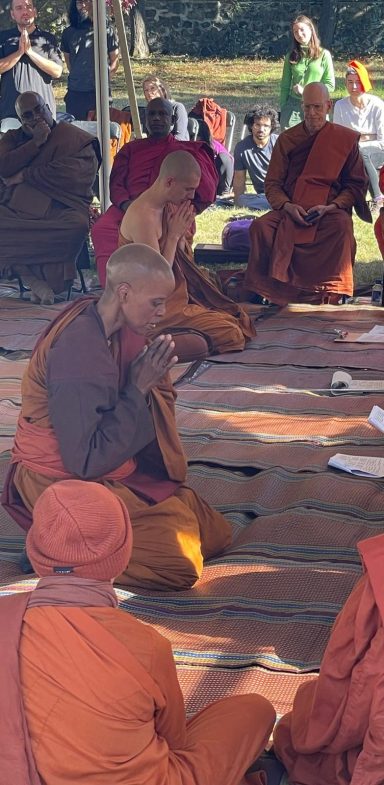
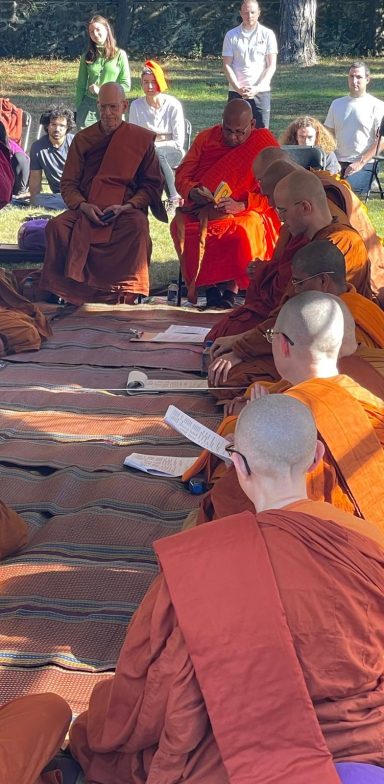


It was a profoundly joyful and uplifting occasion for the Sangha as well as the many lay friends who were present for the upasampada ceremony.
Many of the monastics had travelled from afar to be able to be present. We had the opportunity to be togther for a number of precious days. There were meetings to discuss the shared life and practice, Dhamma and Vinaya.
Visiting monastics were able to offer teachings both online and in person at the monastery as the weekend events continued as usual.
Restraint of the eye is good
Good is restraint of the ear
Restraint of the nose is good
Good is restraint of the tongue
Restraint of the body is good
Good is restraint of speech
Restraint of mind is good
Everywhere, restraint is good
The mendicant
Restrained everywhere
Is released from all suffering.


Going Forth
Going Forth into the homeless life
and acceptance into the
Buddhist monastic community.
September Dhamma Sharing
Dear Friend,
Autumn greetings and good wishes to you!
I hope that you are well in every way.
The past month has been a time of gatherings for me.
I have just returned from a few precious days of a European Buddhist Teachers’ meeting. It took place in the beautiful, peaceful Chan Centre near Zagreb in Croatia. Twenty of us were able to meet as dear Dhamma friends. We explored many aspects of practice in all our different Buddhist traditions. This was a heartwarming and joyful time.
Also I have been meeting with a group of old school friends. We are all turning 60 this year and seem to have time nowadays to reach out and reconnect. So much rich sharing of our various lifetimes!
Here are images from my Thai Buddhist schoolfriend Cat’s garden. Little did we know as girls that I would become a Buddhist nun and our sharing would extend to the liberating Buddha Dhamma!


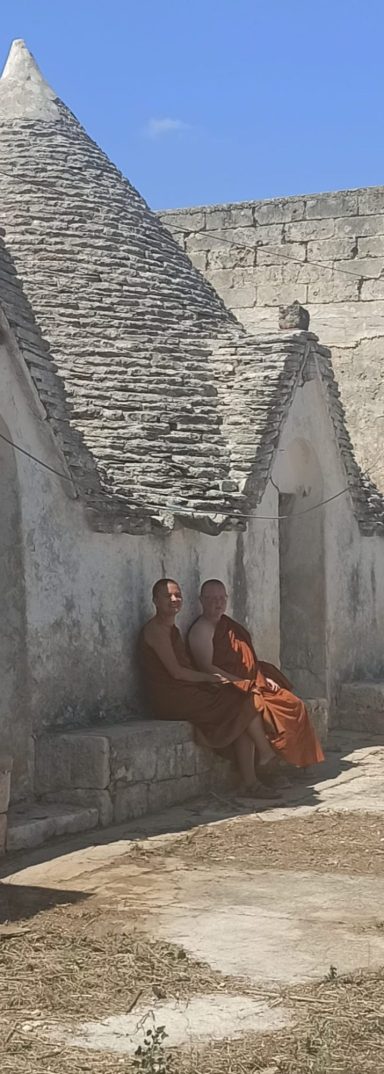
And I have visited our new forest monastery, Lena Bhavana, in Apulia, Italia.
It comprises 136 acres of forest and two large fields for permaculture. This will be the ground for bhikkhunis and bhikkhus to train and for lay people to develop their practice living simply in nature.
The nearby town of Acqua Viva Della Fonte is an hour’s walk away for alms round. There is a deep well with abundant sweet water. There are the sacred caves of St Elia, the heart of the monastery. It is surrounded by farmland and olive groves.
There are a number of large buildings with thick walls, built to last. Although work needs to be done to restore them, we envisage a kitchen and dining area, indoor meditation spaces and some accommodation and even retreats happening in the not too distant future.
Here we are with the beginnings of the monastery library and with wooden Buddhas - all donated by dear Dhamma sister Sheila Kirwan. Thank you Sheila!


The Gradual Path
The Buddha laid out the entire path from wherever we are
to Nibbana
clear and direct for all
The Essence
of the Practice
How to avoid settling
for anything less
than the essential
goal of the practice
Late summer greetings from the Engish countryside.
Here, the season is gently starting to shift into autumn/fall. Leaves are changing, crops are being harvested, birds are feasting. There are berries in the hedgerows, fruits ripening. We’re easing into shorter days, chillier evenings and mornings.
I feel how this changing season naturally invites reflections on the passing of time. As abundant growth fades and turns into the ground for the next arisings, there’s a clear invitation to join in the dance of life, loosen up and let go of any resistance to its ebb and flow.
Anicca!



“When your house is on fire
You rescue the pot
that is useful.
Not the one that is burnt.
As the world is on fire
With old age and death
You should rescue
by giving.
Only that which is given
Can be rescued”
AN 3.52
I turned 60 this month.
Bodily changes are almost imperceptible year on year, but accelerate with age don’t they? I’m noticing the odd wrinkle, softening skin, sometime stiffening joints, more fragility and vulnerability, a less reliable memory . . .
How is it to embrace this incredible embodied journey we are on? How can we ‘be the Buddha seeing the Dhamma’ at every turn?
Here is a talk from this past month on old age, sickness and death.


A learned noble disciple
Has drawn out sorrow's poisoned arrow
Sorrowless, free of thorns
That noble disciple only extinguishes themselves
AN 5.50

The Hearts' Release
Karajakáya Sutta, The Body Born of Deeds
and
Lonakapallasutta, A Lump of Salt
AN 10.219 + AN 3.100
In Sickness and
In Death
Exploring the way to relate
to these afflictions
with grace
for liberation
Cultivating Compassion
A 45 minute guided meditation followed by some conversation about meditation practice
Spiky Meets
The Buddha
The Buddha's consistent
patience and kindness
towards all beings
Suciloma Sutta Sn 2.5/SN 10.3
+ Akkosa Sutta SN7.2

Some reflections from this past month . . . On the topic of “Making Peace” . . .
Whenever we think we know something, whenever we therefore think we’re right about anything, let’s remember the Buddha’s teachings. His teaching is, “Don’t hold on to those views!”
Don’t think you have got it sussed. Don’t think you understand. Don’t allow the mind to narrow down and fixate and hold to any kind of view whatsoever.
Why not?
Because any view whatsoever is going to create suffering when we hold to it and reify it and make it something like a permanent or secure or safe concept for us.



“The Tathagata has woken up to the highest,most excellent peace.
That is, the freedom from clinging.”
MN120
To let go is the ultimate peace, the peace that we are all seeking. All beings are seeking that peace, that rest.
We may not feel that we are seeking peace. It’s something of an acquired taste. People actually love their suffering. People love turmoil. We love to be agitated and troubled, because it gives us a sense of self, it defines us. It gives us a sense of mission or something to do, something to relate to.
So we can be very strangely comfortable with our suffering, strangely wiling to continue to suffer, because we don’t know any better.
And so maybe the first step one could take towards peace is to recognise its value.
How do we get to recognise the value of peace, of letting go? Of letting go from clinging to any kind of view, or ideology, from ingrained habits and compulsions.
First, meditation gives us a window, a doorway to noticing how peace is something to value, something precious, priceless.
And then as we begin to take in the Buddha’s teachings, we can apply the Eightfold Path to our lives and we have the chance to notice how keeping the Precepts, practising virtue by speech, action and livelihood, how these Path aspects bring peace in their wake . . .
And then, the mental development aspects of Path, the meditation aspects, Right Effort, Right Mindfulness and Right Focus or Stillness, Concentration. These also incline us ever more towards peace, towards letting go.
The Buddha’s teachings on sense restraint again quite naturally enable more space, more quiet time, supporting peace and well being.
And then we can practice self-effacement - investigating the teachings of MN 8 each day - considering and reflecting deeply on how the day has been, “Have I manifested any unwholesome qualities?”
We can literally peel away layer after layer of defilements when we apply ourselves in this way.
All of this is pointing towards goodness, towards peace, towards well being, towards, nibbana, towards letting go of all suffering.
The Buddha said that this foundation of peace in our hearts is the pacification of greed, hatred and delusion.
So this is the way to be peacemakers in the world. To deal with our own dark places, strongly held views, our own harming habits. To uproot them, let them go, pacify them.
Energetically developing good qualities in all the aspects of our life touched on here, we can eclipse the sources of suffering, of agitation entirely. And experience true and lasting peace.


The Four Resolutions of the Sage at Peace
MN 140, The Exposition of the Elements
with Ayya Sobhana
Developing awareness
of body, breath, mind
& Dhamma
A 40 minute guided meditation
folowed by a brief Q&A
Turning the Wheel
of Dhamma
How to set into motion
and sustain Dhamma practice,
leading to liberation from
all the causes of suffering
Dear Friend,
As the northern spring rolls on into summer, can we give ourselves time out for meditation? Perhaps to enjoy peaceful places out in nature, quiet places to help us to practise, to cultivate mindfulness.
And when we’re in the midst of busyness, lots of things going on around us in the human realm, can we cultivate a sense of stillness, peacefulness and seclusion in the heart?


This quality of viveka, seclusion, doesn’t actually depend on being alone in quiet spaces. It depends upon a heart/mind of non-reactivity, through mindfulness, through presence. Making this our priority.
Can we do this? Can we put mindfulness first? Can we be aware even in the midst of the conversation? Even in the midst of family life? Can we maintain a degree of centredness?
So how do we cultivate emptiness?
Not through dwelling in states of peace and bliss in our meditation practice.
Ethos
Well, we can have times when we have a real boost for our practice through peacefully abiding in meditation. But the point of meditation and cultivation of mindfulness, cultivation of stillness, is to be able to direct that very clear, bright mind to the sources of suffering. To root them out. To investigate the Dhamma here deeply.
Is there any desire at this moment? Is there any leaning away from the moment through aversion? Is there any confusion or delusion in the mind?
And we want to keep investigating and taking great interest in any manifestation of dis-ease here, any disharmony, any agitation here. That is our work.
To be awake to that and thereby to understand what is happening, to see the Four Noble Truths. To see suffering, to see, tease out, investigate what is the cause of this suffering


The Wise Gatekeeper
How to prioritise and maintain mindfulness
at all times
in all situations
Transcendence
How to be free from the unwholesome, evolve into the wholesome
and
to let go of all the ties that bind us
Dear Friend,
What is disillusionment?
It is the waking up to reality, where previously we were dreaming, we were not seeing clearly. We were assuming things were a certain way and actually, when disillusionment happens, its a recognition, “Well actually that’s not correct, they really weren’t like that. Things are not that way. OK. The reality is like this.”
And so, a growing up . . .


. . .To grow in wisdom is to be constantly disillusioned.
Because if we’re growing in wisdom, then we’re going to look back on how we understood things earlier and recognise that we were not seeing things as clearly as we are now. So by its very nature, growth on the Path is going to involve a falling away of illusion after illusion as ignorance is turned into knowledge and understanding.
So in this way of appreciating the benefits of disillusionment, we can be glad when our illusions are shattered, even if this may involve some disappointment, some upset, even despair, even trauma - when we assume things to be a certain way and we discover that they are not so.
We can see in the world around us that there’s a great need for people to step away from illusions and to wake up to reality - the reality of how we treat one another, the reality of how we treat the environment, the immature ways in which we relate to the animal world, the world of nature and to one another with callousness, disregard, disrespect - not recognising that in order to sustain our environment and our communities we have to work hard to look after one another and to look after our animal family and all the different species, all the different beings - to relate to them respectfully and with care, with Metta, with kindness, with compassion.
And to the environment also, the world we live in, which is impersonal. It doesn’t have views about things. The weather is completely . . . it’s impossible to offend the weather, or to disrespect the weather. The natural world around us is completely indifferent to our views and opinions about it.
But we do share this material realm, these elements. Earth, water, fire and air, space and consciousness are not unique to any particular being or any particular species.
And to consider this inter-relationship, this connectness, this web of life and health and that we have a part in this and its important for us for sure to take care of what we use, what we eat, how we live. Not to create a whole load of garbage. Not to make a mess of things. Not to destroy things. Not to obliterate nature in the interests of, what? Mining for diamonds? Mining for minerals, for what purpose? Burning oil, burning fossil fuels - a habit we’ve got into and one that is very destructive, very harmful for the entire environment in which we live.
And so in these ways, we need to wake up. We need to step away from the illusion of endless resources for our consumption. And to step away from treating others as anything other than ourselves.
If I hurt you then I hurt myself. If I harm any being, I’m harming myself. If I have the attitude of dehumanising or disconnecting from any other being then I’m dehumanising and disconnecting from myself. How much suffering, how much blindness in that?
And so to shed these illusions of perpetual benefits for the wealthy and privileged and disregard for the neglected and underprivileged . . . All of this, this is a growing up that so needs to happen.
And spiritually to be very awake to the willingness to let go. Let go of ideas. Let go of views. Let go of the sense of knowing anything at all. To be willing to be very open. To be a Holy Fool. To be an innocent.
And investigate these Dhamma Teachings again and again. And always with a fresh eye, a fresh heart. As if we’ve never heard them before. As if we really know nothing and we’re open to learning whatever we can.
Disillusionment can be a source of disappointment, sometimes even bitterness. You know, cynicism, turning away from situations.
It doesn’t have to be that way. Disillusionment is something we can notice and we can carefully choose our response. We don’t want to allow disillusionment to turn us away from the good, to stop us trying, to make us remove ourselves from the company of others, to dismiss or to give up on others if they are involved in this process of disillusionment that we’ve experienced, or we’re experiencing.
On the contrary, let’s consider being grateful for disillusionment. Let’s consider disillusionment as a gift. As a great boon, and a blessing and a benefit for us. Because its when the scales fall from our eyes, its when were growing up, part of the maturing into wisdom.
And so, can we combine, when we feel we’ve been disillusioned, we feel weve been let down in some way by those around us, by the teachings, by our understanding of the spiritual path . . . Whenever we feel let down by anything and disappointed, can we bring up gratitude in the heart? And see, “How can I use this disillusionment for Path? How can I turn this disillusionment into the wisdom that it is and bring it back into the mix.
Whatever situation we’re in, when we’re disillusioned we dont want to turn away, but rather to compassionately open to the truer understanding of the situation.


Life Is Practice
Exploring MN 2, Sabbásava Sutta
Dear Friend,
In many ways it’s normal for us to have a heart that is kind, that is compassionate, that is resting in well being. This is normal.
But we can be subject to the defilements of ill will, irritability, animosity, even hatred - through inner experiences and through interaction with the world around us - these defilements can come up.
And when this happens, when we’re caught up in aversion, in ill will, then loving kindness becomes something like an antidote. It’s a remedy. It’s a skilful important tool for us . . .


. . . It’s the ability to turn around even the darkest, most desperate kamma, the most difficult situations and bring in light. We can do this.
Let’s remember the power of love. How important and how needed it is in the world. How it transforms the world again and again. How this is a truly memorable quality that we can always access.
This is the real story of this existence in this human realm. This is the real story. This is the real history. That there is love. That there is compassion. That there is the rejoicing in the good of others, in the wellbeing of others. There is this this possibility of sharing. That there is peace here.
And it is up to each one of us to make it this way. We all have this responsibility.And its a call for us in every moment in a world that can seem so troubled, so desperately struggling and suffering, so confused, so misdirected the energies in this world, in this human realm. The priorities are really not such wholesome priorities often. There’s not a lot of morality necessarily manifesting on the grander scale in our human realm.
But we all have a responsibility to make it good. To make a difference and to transform the unskilful into the skilful. To transform hatred into love.
As the Buddha said, there is only one remedy for hatred, only one way out of hatred. The remedy for hatred is love.
So where there is hatred, where there is cruelty, where there is ill will, let’s remember we can bring in, we can generate and we can radiate this powerful quality of love.
Sutta Study
Aspects of Mindfulness
Sutta Reading and discussion
with
Vens. Dhammānusārī, Dhammavarā, and Dhammavihārī.
Samyutta Nikaya 47.3

The Power of Love
The benefits of cultivating
loving kindness


Seeds
The Buddha's simile
in Samyutta Nikaya 22.54
Seeds of consciousness
planted in the earth of form
watered by desire
Laying Down the Burden
What is this burden?
How did it get here?
Who is carrying it?
. . .
How to put it down

Sutta Study
Anything that has a Beginning has an End
Sutta reflection for Magha Puja Day
recalling Sariputta's stream entry realisation
Mahakhandaka 1.14.
Far
From the
Madding Crowd
How to practice the Buddha's teachings on solitude and seclusion
Wise Witnessing
How to witness reality to enable wisdom and free the heart from all suffering
Poisonous Privilege
Teachings from the Buddha
on the deathly danger
of praise
honour and renown
Entering
the Sacred Space
A 40 minute guided meditation
on breath awareness
Four Oceans of Tears
How Many Tears Have We Shed . . . ?
Patience is a Virtue
The noble virtue of patience, like a bridge over troubled waters
Simplicity in Diversity
January 2024
Dhamma Sharing
Dear Friend,
Greetings and good wishes to you. I hope that you are well and thriving.
I am well. I’m settling into life with my dear elderly parents in Wiltshire, UK. Opportunities to connect with the wider Sangha are arising. All thanks to being able to be online from wherever we are around the world.

I’m offering Dhamma teachings again with my beloved communities in the US - Dhammadharini monastery in CA and Empty Cloud monastery in NJ . . .
I’m co-teaching two sessions each Sunday in February with respected theri Ayya Sobhana and offering Dhamma on Wednesdays for the Empty Cloud Sangha led by Ayyas Suddhaso and Soma.
I’ve also been connecting with my dear old monastic Chan friend, Venerable Jin Ho, honorary chaplain at Bristol University. She is based at the vibrant Multifaith Chaplaincy in the heart of the city. To spend time with her is great Dhamma nourishment.
I am blessed to have the opportunity to offer teachings to her students and the wider sangha around her on Fridays in February.


Spiritual friendship, said the Buddha, is the whole of the holy life.
My greatest spiritual friend this lifetime is my dear 85 year old Mum, Theresa. She has determined to sit with me every evening, however weary, dedicating our efforts for peace and ceasefire in our troubled world.
We both know well that a ceasefire has first to come about within our own hearts and minds as our meditation practice makes space for healing and peace.
May all know the peace of harmlessness, of kindliness.
May we all know the happiness of letting go of self centred habits.
May all beings open to the joy of serving and supporting one another, in peace and friendship.

Upcoming retreats
12 - 16 June at Sunyata Ireland -
www.sunyatacentre.org
8 - 16 July Ekuthuleni rustic retreat -
www.ekuthuleni.org
** And a special announcement **
New monastery in Apulia, Italia
See www.emptycloud.it
for news and a chance to contribute

December 2023
Dhamma sharing
Greetings and good wishes for the New Year

Dear Friend,
I hope you are well, happy and peaceful. The festive season can be joyful, or it can be lonely and sad. We know that it may be a time of counting the blessings, warm and safe and surrounded by family and friends for many, while for others right now it is a time of great suffering, trauma and loss.
However it is for you, may the goodwill of this holiday manifest all around you and within you.
May we continue to develop tender hearts of compassion for the suffering in the world, rejoice in the goodness that is apparent and maintain loving kindness and peace as wise response to every situation.
November 2023
Dhamma Sharing
I'm well and hope that you are also well in every way. I'm experiencing a profound sense of homecoming nowadays, as I am staying on with my parents in an open-ended way, in their lovely home and village in the UK.
It's a homecoming especially in the sense of deeply stilling and entering into the heart. Being with old age is a slowing down. An embracing of impermanence. A welcome to the truth of not knowing. A letting go.
It's beautiful to be here with my dear elderly Mum and Dad. A chance to repay some of the great love and care that I have received from them my whole life and to keep cultivating love, care and patience, opening to nature, to Dhamma.


A Contemplation
From The Greater Discourse of the Buddha on the Mass of Suffering
MN 13
". . . With sensual pleasures as the cause, sensual pleasures as the source, sensual pleasures as the basis, the cause being simply sensual pleasures - kings quarrel with kings, nobles with nobles, brahmins with brahmins, householders with householders, mother quarrels with child, child with mother, father with child, child with father; brother quarrels with brother, brother with sister, sister with brother, friend with friend.
.
And here in our quarrels, brawls and disputes we attack each other with fists, clods, sticks or knives, whereby we incur death or deadly suffering . . . We take swords and shields and buckle on bows and quivers, and we charge into battle massed in double array with arrows and spears flying and swords flashing; and there we are wounded by arrows and spears, and our heads are cut off by swords, whereby we incur death or deadly suffering. This too is a danger in the case of sensual pleasures . . . the cause being simply sensual pleasures.
. . . And we charge slippery bastions, and we are wounded by arrows and spears, splashed with boiling liquids and crushed under heavy weights . . . And we break into houses, plunder wealth, commit burglary . . .
Thus, we, people indulge in misconduct of body, speech and mind. Having done so, on the dissolution of the body, after death, we reappear in states of deprivation, an unhappy destination, in perdition, even in hell. This too is a danger in the case of sensual pleasures . . . the cause being simply sensual pleasures.
And what is the escape in the case of sensual pleasures?
It is the removal of desire and lust, the abandonment of desire and lust for sensual pleasures. This is the escape in the case of sensual pleasures
Healing Dhamma
A burning question for this time is, "How do we allow ourselves to open to the pain and grief of our sisters, our brothers, our children without bitterness? Without trauma? Without re-enacting and extending the pain, like a voracious fire that ravages everything in its path?
The trauma that we share in our human family is surely all of our work. It is our Dhamma duty to attend to it, the air that we breathe, the life and death we all share.
Can our collective grief and trauma bring us closer together? Can we recognise our inseparability?
For how can I be happy without you sharing my happiness? And how can you be in fear and pain without me being affected?
May the practice of meditation continue to help and guide us in healing the human world from within. May we have the possibility to stop, to sit and to feel. To breathe deeply. To allow and to open to the collective suffering and make peace within us.

No thought is required, no view, no solution. No side, no stance, no holding back, no other. We are surely all alive in this world to wake up. To heal and repent. To apologise. To mourn fully and release the pain that makes us feel separate and reactive. To see for what they are the projections of our unfinished healing onto the creations we call "other".
There is no other. We are us. All that happens in this world can be known, felt bone deep and understood. My body, my blood. One family, one land.
This is the invitation. From the broken hearted, the maimed and the defeated. From the unheard, the alone and the lost. "May we be seen! May we be heard! May we be held tenderly in consciousness. May our suffering be acknowledged, fully felt and owned. May we be welcomed warmly home. May we heal and know our true potential, the natural resting place that is love, compassion, joy and peace.

October 2023 News
We are told of heavenly messengers
or, in Pali, Devaduta
They are sickness, ageing and death. They remind us of the truth of our fragile existence.
Are are other heavenly messengers we could consider? War, famine, thirst . . . climate change?
The Buddha described the first three mentioned here - as well as the message of those who have renounced the world to follow the spiritual path, to search for truth.
Truth is elusive in our everyday life. Lies and distortions of reality are commonplace. It is difficult to know where we stand, to have any sense of common ground, or of any solid, secure foundation to rest upon. The Buddha told us that the whole world is shaking, unstable, inconstant. There is no refuge here for us.
The only shelter from the storms, the only real refuge is Buddha, Dhamma, Sangha. Simply put - awareness, truth and community. Or we could say, The Buddha, the Teachings and Those who have realised the way out of suffering by understanding the Teachings.
May we stand firmly in this Way of practice and be guided and nourished by the timeless Dhamma taught by the Buddha in northern India 2,700 years ago - that which is always apparent, universally applicable, freely offered to everybody everywhere.
May all beings
be free from suffering
and its causes
The Palestinian people of Gaza and beyond
are living with thirst, hunger, homelessness, destruction, fear, trauma and grief. They surely have a clearer sense of change, of loss and of impending death than most. They are living and manifesting now more than ever the vulnerability, the defencelessness of our human state. The heavenly messengers are all around for us to see.
May the sacrifice and immense suffering of the women, men and children in Gaza today be a source of liberation of hearts and minds so that this genocide can have some meaning, some purpose even as their immense suffering unfolds at this terrible time.
Free Palestine.

from A Walk In The Woods by Ven. Khantipalo
All compounds break down
All made things fall into pieces
All conditioned things pass away
With the passing away of those conditions
Everything and everybody
(That includes you and me)
Deteriorates, ages, decays
Breaks up and passes away
And we,
Living in the forest of desires
Are entirely composed of the impermanent

Yet our desire tells us to not see this
Though impermanence stares us in the face
From every single thing around us
And it confronts us when we look within
Mind and body Arising and passing away
So don't turn on the TV, go to the pictures, read a book seek some food
Or 100 other distractions Just to avoid seeing this
This is the one thing really worth seeing
For one who fully sees it in themselves is free.
September 2023 News
Dear Friends,
Warm greetings and good wishes to you from early autumn breezes, reddening maple leaves, cloudy skies and chill morning air on a mountain ridge monastery in New Jersey.
The Vassa at Empty Cloud is coming to a close. It has been a precious time of communal harmony, shared Vinaya studies, walks in nature and Dhamma explorations over cups of green tea poured by our Venerable Abbot and brother Ayya Suddhaso.
I'm full of gratitude for fellow monastics Ayyas Suvijjana, Suddhaso, Sanathavihara, Soma and our inspiring teenage brother Samanera Vaddha for this time together.
I will be saying goodbye and returning to Europe in a few days, to spend time with family and friends in Ireland, Scotland and England for the month of October.
May I wish you all well in these times of great upheaval for brothers and sisters in so many parts of the world, where wild weather has been a cause of devastating loss of loved ones as well as homes and whole communities.
May our deepening understanding and practise of the Buddha's teachings in our lives bring inner safety and strength of heart, for self and others.
With Metta and appreciation, Ayya Brahmavara

Monk Chat 19.09.23
Dhamma conversation with an assortment of great questions
from the Empty Cloud online community
Monk Chat
Questions and answers
covering a broad range of Dhamma topics
from Empty Cloud monastery
Vassa 2023
August 2023 News
Dear Friends,
Thank you for subscribing to my website and/or supporting my life as a bhikkhuni.
I am in the midst of the Vassa, or annual three months' 'rains retreat', at Empty Cloud monastery in New Jersey. We are a happy community of six monastics. This week we are focusing on meditation practice. Other times we give time and energy to Vinaya studies. It is good to learn from one another and to sit together.
We are offering teachings mostly in house, on weekends. These are not recorded. However there are also online Dhamma sharings a few times each week
- https://www.youtube.com/@BuddhistInsights/streams
This summer has felt to me to be the best of times to consider uncertainty, this aspect of anicca, as the climate has been changing even more rapidly than expected. We're all witnessing unprecedented ice cap melt, forest fires, floods and record breaking temperatures on both hemispheres of our beautiful planet.
With these events unfolding, I've been contemplating the Buddha's teachings on dependent co-arising, cause and effect. Recognising how nothing happens without reason. This great way of seeing gives perspective and even though the process is painful, leads to peace and understanding.
From this resourced vantage point, it seems clear that the call is for compassion, for kindness and for calm amidst the storms.
How may I help? Can I engage in rightful action to support myself and others?
Here are some reflections on this theme - https://www.youtube.com/watch?v=RXh6PCz8- . . . the Dhamma talk follows a 30 minute guided meditation.
May we all be guided in this enquiry by the Buddha's ever helpful, timeless Dhamma teachings
With an abundance of gratitude, good wishes and loving kindness for us all and for the Buddha Dhamma, our greatest treasure.

A whole host
of Dhamma questions
Monk Chat at Empty Cloud monastery is an invitation for all those random Dhamma questions that may pop up to be answered.
Here's Bhante Suddhaso and myself taking the opportunity to speak on Dhamma
thanks to these great Qs
Monk Chat
from Empty Cloud
A far ranging discussion on Dhamma
with Ayya Soma and Samanera Vaddha
with thanks to all the great Dhamma questions from our lay friends
The Good News
of Thai bhikkhunis
With thanks to Venerable Ayya Khemavamsi
A Conversation about Samadhi
Sharing of experience of Samadhi practice
with fellow samanas Ayya Sudhasso and Ayya Khemavamsi
The Many Forms
of Conceit
A conversation on Mána
with Ayya Khemavamsi Bhikkhuni
Simplicity
and
Renunciation
with Bhante Suddhaso
Back to the monastery
7 July 2023
Settling in at Empty Cloud monastery, it's a joy to see Ayyas Suvijjana and Soma along with Bhantes Suddhaso and Mettiko again.
I have the honour too of meeting two Venerable bhikkhunis from Thailand who are staying with us for two weeks - Ayya Punnyasiri and Ayya Khemavamsi
Last but not least, it's a joy to meet Samanera Vaddho, aged 19 from Ohio, a most inspiring younger brother who completes our happy monastic group of eight.
Here is a conversation with our esteemed visiting Thai Venerables -
Auspicious time
1 July 2023
As I travel to the US and Empty Cloud monastery today, I am feeling the blessings of this auspicious time . . .
First European bhikkhuni ordinations are happening today at Aneñja Vihāra in Germany - http://anenja-vihara.org/
Recently, the 80th birthday of most respected bhikkhuni Elder, Jetsunma Tenzin Palmo - https://m.youtube.com/playlist?list=PLQfTnGpIJDBQi8GIUtqcmIHdz4GuUhdij&fbclid=IwAR0mV4aMSn7v-wpVOBwKusgm4h05OdZoxIBLy34VSm3OPK0UseLBToAcw5g
40th Anniversary Celebrations today at Wat Buddhanusorn in California, dear Luang Por Ajahn Maha Prasert's 77th Birthday and his promotion by royal decree as a leading senior monk to "Chaokhun Thep." - https://www.watbuddha.org/
And tomorrow is Asalha Puja, the Full moon Uposatha Day and start of Vassa 2023 for many in the Theravada Buddhist world.
I'll be spending the Vassa at Empty Cloud - click the link below for the monastery website . . . so grateful to be able to practise with the Sangha there 🙏🏾
Dealing with Anger
An interview with friend Kim Mulligan
on how to relate to anger
The Pacific Coast
27 March 2023
Scenes from our community day out in nature last week.
Meditating on the sea . . . opening the mind wide to aniccasañña, with the only constant the ebb and flow of the waves . . .
Currently in Sonoma County, CA
9 March 2023
Staying at Dhammadhārinī monastery with bhikkhunis, samaneras, anagarikas and lay friends.
Grateful for practice in community, the opportunity to support respected senior bhikkhunis as they are in secluded retreat - Ayya Tathaloka here at Dhammadharini monastery and Ayya Sobhana at Aranya Bodhi, our redwood forest hermitage near the coast
Peaceful winter retreat time for the Sangha here, with occasional uplifting visitations from good Sangha friends.
Donations towards Ayya's requisites
of food, shelter, medicine and travel
gratefully received
here





























